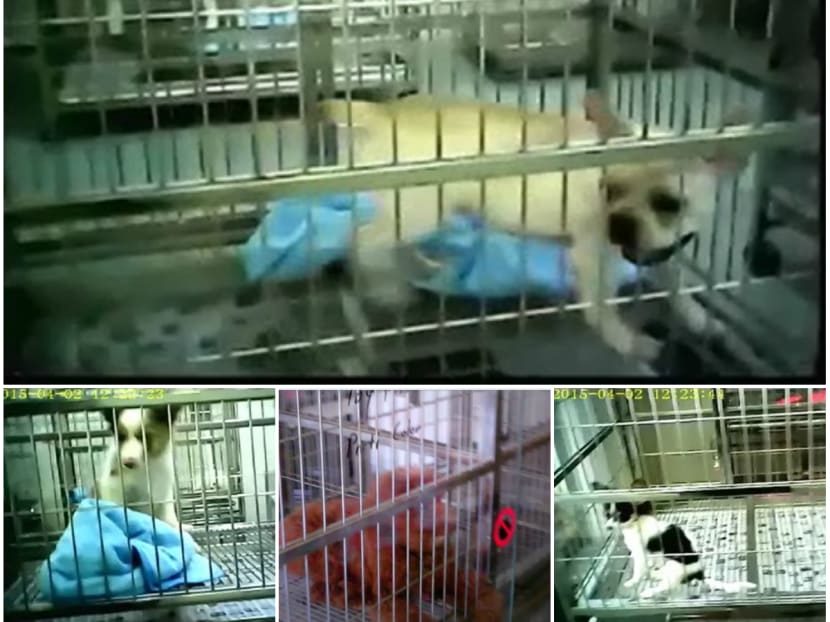Many top-graded pet shops 'fail in animal welfare'
SINGAPORE — Despite obtaining an “A” grade under the Agri-food and Veterinary Authority (AVA) Pet Shop Grading Scheme, several pet shops had failed to provide basic animal welfare, said the Animal Concerns Research and Education Society (ACRES) today (May 20), citing findings from a two-month-long undercover operation.

21 pet shops were found to have breached one or more conditions under the Pet Shop Licence Conditions. Photos: ACRES
SINGAPORE — Despite obtaining an “A” grade under the Agri-food and Veterinary Authority (AVA) Pet Shop Grading Scheme, several pet shops had failed to provide basic animal welfare, said the Animal Concerns Research and Education Society (ACRES) today (May 20), citing findings from a two-month-long undercover operation.
These included failing to provide adequately-sized enclosures for dogs and cats, proper flooring conditions and clean drinking water.
Of the 30 pet shops the ACRES undercover team visited between March and May, 21 shops were found to have breached one or more of the AVA’s Pet Licence Conditions.
Ten of the pet shops failed to display their assigned grades, while the remaining 11 had not provided basic animal welfare.
The team also visited 12 animal farms during the operation and found 10 to have similar breaches in animal welfare conditions.
Most pet shops, said ACRES, failed to provide an enclosure big enough for the enclosed animal to move about comfortably.
According to the licensing conditions on the AVA’s website, the length of an enclosure has to be at least twice the length of the animal, while the width has to be at least one-and-a-half times the animal’s length.
The greater concern, though, was that seven of the 11 shops that failed to provide adequate living conditions, were awarded top grades by the AVA, said ACRES Group Director (Wildlife) Anbarasi Boopal.
This raises questions about the current assessment system, especially since these shops had their gradings reviewed fairly recently in February, she added.
Failing to display a shop’s grade was another problem that ACRES highlighted. Not only is this against the AVA’s regulations, displaying the decal also helps consumers to make informed choices and decide whether to support the establishment and its practices, said ACRES Head of Campaigns Noelle Seet.
The ACRES undercover operation also proved another point — that anyone is capable of looking out for errant practices when equipped with sufficient knowledge of the conditions.
“You don’t need to be an expert, you just need to know what these conditions are. Because we did this, it shows that members of the public are equally capable in monitoring pet farms and pet shops in Singapore,” said Ms Seet, adding that licensing conditions can easily be obtained on the AVA’s website.
However, ACRES noted that when it comes to guidelines governing pet farms, only a small excerpt could be found on the AVA’s “petsforlife” website. The excerpt states that dog farms are required to comply with similar animal welfare conditions that pet shops must follow.
In response to TODAY’s queries, the AVA said it has received ACRES’ report and is conducting investigations.
The AVA noted that pet shops’ licences are renewed annually, and graded according to a shop’s history of compliance with the agency’s licensing conditions and adoption of industry’s best practices. The grades are reviewed whenever a shop is compounded for an offence.
“Pet shops and farms are inspected regularly, as well as in response to public feedback ... If any infringements are found, AVA will warn the licensee and ensure that the necessary rectifications are made,” the AVA said.
If the infringements have a direct impact on animal welfare, a composition fine will be issued.
Repeat offenders also face the possibility of being convicted in court and fined up to S$5,000. Errant establishments also risk getting their licences suspended or even revoked.
The AVA said in the past three years, it has dealt with 40 cases involving establishments that failed to comply with licensing conditions, and they were issued composition fines.






